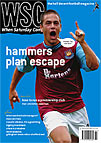 John Fashanu's latest venture is the small Welsh team Barry Town. Simon Price outlines the reasons behind the new arrival
John Fashanu's latest venture is the small Welsh team Barry Town. Simon Price outlines the reasons behind the new arrival
When John Fashanu popped up on Talk Sport in December to announce proudly that he had bought the champions of Wales, there were many patronising references to “little Barry Town”. In some respects, this is understandable. Barry, for the uninitiated, is a seaside town at the southernmost tip of Wales with a population of 50,000. The town is a microcosm of the Old Wales: sheep farms to the north, Bhopal-sized chemical plants to the east, dying dockyards to the south, and a third-rate mini Blackpool called Barry Island to the west. Most people with the means to do so get the hell out. Why, then, is Flash Fash moving in?
If the town has one cause for pride, it is its football team. This is a recent development. The high point of its first 80 years, spent mainly in the English pyramid, was running QPR close in the FA Cup third round back in the Sixties. However, after joining the Welsh system in 1993, Town have had a stranglehold on the League Of Wales, with six championships in seven seasons, a domestic treble in 1996-97 and a record-breaking run in 1997-98 when they ended the season undefeated, 26 points clear.
The success was not without the whiff of controversy. The club went full-time professional in 1995 with the backing of a local council/local business partnership brokered by Vale Of Glamorgan councillor Shaun Stringer, who also happened to be the club’s commercial manager. Stringer then landed a £394,000 grant to upgrade Jenner Park; after rumours of misappropriation of council funds, the local authority watchdog launched an investigation, and Stringer pleaded guilty to four charges of abusing public office.
However, it isn’t Barry’s domestic success – ill-gotten or otherwise – which will have attracted Fashanu, but our annual European adventures. In 1996, a UEFA Cup run saw off Latvia’s Dinaburg Daugavapils and Hungary’s Budapest Vasutas before a narrow defeat to Aberdeen. Since then, Barry have stepped up to the Champions League preliminaries, though in two successive seasons we were drawn against the mighty Dinamo Kiev and received a sound spanking each time.
The first concern of any sane fan when a rich carpetbagger arrives is asset-stripping, particularly since the stumbling block to Fashanu’s much-publicised attempt to buy Northampton Town at the tail-end of 2001 seemed to be the council’s refusal to sell Sixfields. In this case, however, that seems unlikely: Jenner Park is owned by the council, and a covenant states that it must be used for football.
He probably isn’t interested in getting his grubby mitts on the gate receipts either: frustratingly, despite the team’s success, all but a hardy 400 Barrians prefer to watch Liverpool down the pub. Indeed, he will be inheriting several unpaid and unexplained debts dating back to previous regimes.
In fact, Fashanu has been quite open about his motives: his Winners Worldwide agency, backed by insurance millionaire Chief Sonny Odogwu, will bring young African players to the club, fix them up with EC work permits, and sell them on via the European football shop window.
Fashanu proudly announced a first-refusal deal with Manchester United, similar to that “enjoyed” by Royal Antwerp. There is also talk of importing benchwarmers from other European leagues, with Taribo West being the biggest name bandied about, and frankly dubious reports that our games will henceforth be watched by millions on Nigerian television.
Despite the obvious conflict of interests inherent in one man being both chairman and agent, this plan has received a surprisingly warm reception from fans. There was much commotion when Fashanu turned up in the stands halfway through the match with Caersws. As Ian Johnson of the official supporters club puts it: “We can see where he makes his money, and that takes a certain amount of concern out of it.”
Historically, however, Town haven’t been a selling club. Fashanu’s dubious logic is that by turning Barry into a cash-and-carry for short-stay Africans, it will improve performances on the pitch: a win-win deal. At the time of writing, with Barry’s grip on Welsh football slipping and with TNS taking the league by storm, the biggest worry is that Fash’s buy-and-sell spree will do for team unity what his elbow did to Gary Mabbutt’s cheekbone.
From WSC 192 February 2003. What was happening this month